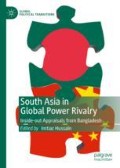Abstract
Reaffirming the liberalist bent of the findings, as noted in the “Introduction” chapter, the volume’s “Conclusions” chapter also accents a strong realist challenge. Empirically finding the necessary pre-condition to global leadership being more domestic than the theoretically expounded “outside-in”, this chapter finds the realist heat strongest at the inner-most circle, the liberalist at the outer-most, and though contestation prevails in both these domains, they play each other off most robustly in the mid-stream circle. These address, and open up, infinite and dynamic transitions, illustrated particularly in the heavier role of nationalistic (or inside-out) against systemic (or outside-in) imperatives globally, utilizing mostly soft-power instruments presently than hard-power (though one of those transitions is from the former to the latter).
Access this chapter
Tax calculation will be finalised at checkout
Purchases are for personal use only
Notes
- 1.
See Sandra Destradi, “Regional powers and their strategies: Empire, hegemony, and leadership,” British International Studies Association, vol. 36 (2010): 903–30; and David A. Lake, “American hegemony and the future of east-west relations,” International Studies Perspectives 7, no. 1 (February 2006): 23–30.
- 2.
David Lake, “Leadership, hegemony, and the international economy: Naked emperor or tattered monarch with potential?” International Studies Quarterly 37, no. 4 (December 1993): 459–89.
Bibliography
Destradi, Sandra. 2010. Regional powers and their strategies: Empire, hegemony, and leadership. British International Studies Association, vol. 36 (2010): 903–30.
Lake, David A. 2006. American hegemony and the future of east-west relations. International Studies Perspectives 7, no. 1 (February): 23–30.
———. 1993. Leadership, hegemony, and the international economy: Naked emperor or tattered monarch with potential? International Studies Quarterly 37, no. 4 (December): 459–89.
Author information
Authors and Affiliations
Corresponding author
Editor information
Editors and Affiliations
Rights and permissions
Copyright information
© 2019 The Author(s)
About this chapter
Cite this chapter
Hussain, I. (2019). Conclusions: Global Leadership of a Glocal Kind. In: Hussain, I. (eds) South Asia in Global Power Rivalry. Global Political Transitions. Palgrave Macmillan, Singapore. https://doi.org/10.1007/978-981-13-7240-7_11
Download citation
DOI: https://doi.org/10.1007/978-981-13-7240-7_11
Published:
Publisher Name: Palgrave Macmillan, Singapore
Print ISBN: 978-981-13-7239-1
Online ISBN: 978-981-13-7240-7
eBook Packages: Political Science and International StudiesPolitical Science and International Studies (R0)

